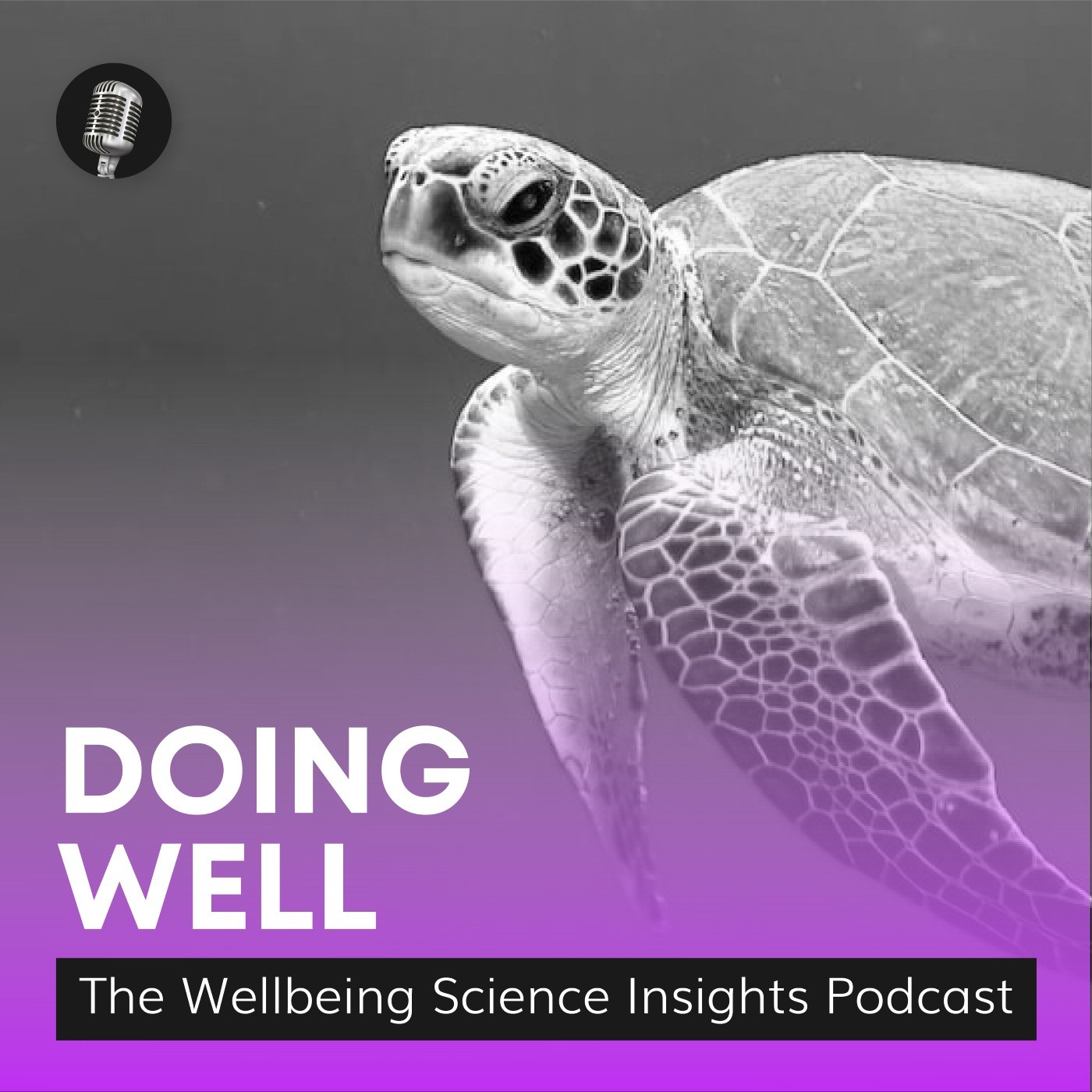Listen "Shelley Hall: Stimulating Your Brain for Better Self-Awareness | Doing Well #69"
Episode Synopsis
What if you could rewire your brain to boost self-awareness? In this episode of Wellbeing Science Labs, host Lu Ngo delves into the fascinating world of neuroscience with Clinical Psychologist Shelley Hall. Get ready to explore how stimulating your brain can lead to a deeper understanding of yourself and improve your well-being.
Shelley Hall is an experienced Clinical Psychologist with a special interest in neuroscience and Brain Working Recursive Therapy (BWRT). She works with adults and children, helping them overcome trauma, emotional regulation issues, and self-harm. Shelley Hall’s holistic approach to mental health, combined with her expertise in brain-based therapies, enables her to provide client-centered solutions for long-standing psychological challenges.
In this insightful episode, Shelley Hall unpacks the science behind self-awareness and its impact on well-being. She explains how meditation can enhance self-awareness by engaging neurological mechanisms, including the default mode network, which plays a crucial role in self-reflection.
Shelley Hall also dives into brain plasticity, highlighting how our understanding of it shows that self-awareness can be cultivated over time. She offers practical, research-based tips listeners can use to stimulate their brains and boost self-awareness in their daily lives.
Connect with Shelley Hall’s social media on:
LinkedIn: http://www.linkedin.com/in/shelley-hall-zululandpsychologist
Website: http://www.shelleyhall.co.za/
Instagram: https://instagram.com/shelleykimhall?igshid=OGQ5ZDc2ODk2ZA==
Facebook: http://www.facebook.com/zululandpsychologist
Produced by the Wellbeing Science Labs, a division of LMSL, the Life Management Science Labs.
Explore LMSL at https://lifemanagementsciencelabs.com/ and visit http://we.lmsl.net/ for additional information about Wellbeing Science Labs.
Follow us on social media to stay updated:
YouTube: https://www.youtube.com/@wellbeingsciencelabs
Facebook: https://www.facebook.com/wellbeing.science.labs/
Instagram: https://www.instagram.com/wellbeing.science.labs/
LinkedIn: http://linkedin.com/showcase/wellbeing-science-labs
Twitter: https://twitter.com/WeScienceLabs
TikTok: https://www.tiktok.com/@wellbeing.science.labs
You can also subscribe and listen to our podcasts on your preferred podcasting platforms:
Apple Podcasts: https://podcasts.apple.com/us/podcast/doing-well-the-wellbeing-science-insights-podcast/id1648515329
Spotify: https://open.spotify.com/show/63Gni7VN4Ca6IicSuttwQL
Amazon: https://music.amazon.com/podcasts/7cd001d1-b7ba-4b22-a0f3-17c1a9c6e818/doing-well-the-wellbeing-science-insights-podcast
iHeart Radio: https://www.iheart.com/podcast/338-doing-well-the-wellbeing-s-102890038/
Podbean: https://wellbeingscienceinsights.podbean.com/
PlayerFM: https://player.fm/series/3402363
Podchaser: https://www.podchaser.com/podcasts/doing-well-the-wellbeing-scien-4914859
Shelley Hall is an experienced Clinical Psychologist with a special interest in neuroscience and Brain Working Recursive Therapy (BWRT). She works with adults and children, helping them overcome trauma, emotional regulation issues, and self-harm. Shelley Hall’s holistic approach to mental health, combined with her expertise in brain-based therapies, enables her to provide client-centered solutions for long-standing psychological challenges.
In this insightful episode, Shelley Hall unpacks the science behind self-awareness and its impact on well-being. She explains how meditation can enhance self-awareness by engaging neurological mechanisms, including the default mode network, which plays a crucial role in self-reflection.
Shelley Hall also dives into brain plasticity, highlighting how our understanding of it shows that self-awareness can be cultivated over time. She offers practical, research-based tips listeners can use to stimulate their brains and boost self-awareness in their daily lives.
Connect with Shelley Hall’s social media on:
LinkedIn: http://www.linkedin.com/in/shelley-hall-zululandpsychologist
Website: http://www.shelleyhall.co.za/
Instagram: https://instagram.com/shelleykimhall?igshid=OGQ5ZDc2ODk2ZA==
Facebook: http://www.facebook.com/zululandpsychologist
Produced by the Wellbeing Science Labs, a division of LMSL, the Life Management Science Labs.
Explore LMSL at https://lifemanagementsciencelabs.com/ and visit http://we.lmsl.net/ for additional information about Wellbeing Science Labs.
Follow us on social media to stay updated:
YouTube: https://www.youtube.com/@wellbeingsciencelabs
Facebook: https://www.facebook.com/wellbeing.science.labs/
Instagram: https://www.instagram.com/wellbeing.science.labs/
LinkedIn: http://linkedin.com/showcase/wellbeing-science-labs
Twitter: https://twitter.com/WeScienceLabs
TikTok: https://www.tiktok.com/@wellbeing.science.labs
You can also subscribe and listen to our podcasts on your preferred podcasting platforms:
Apple Podcasts: https://podcasts.apple.com/us/podcast/doing-well-the-wellbeing-science-insights-podcast/id1648515329
Spotify: https://open.spotify.com/show/63Gni7VN4Ca6IicSuttwQL
Amazon: https://music.amazon.com/podcasts/7cd001d1-b7ba-4b22-a0f3-17c1a9c6e818/doing-well-the-wellbeing-science-insights-podcast
iHeart Radio: https://www.iheart.com/podcast/338-doing-well-the-wellbeing-s-102890038/
Podbean: https://wellbeingscienceinsights.podbean.com/
PlayerFM: https://player.fm/series/3402363
Podchaser: https://www.podchaser.com/podcasts/doing-well-the-wellbeing-scien-4914859
More episodes of the podcast Doing Well: The Wellbeing Science Insights Podcast
Simon Leow: The Impact of Positive Interpersonal Relationships on Mental Health | Doing Well #87
17/09/2025
Matthew Harrison: Technology's Role in Shaping Digital Identity and Wellbeing | Doing Well #86
29/08/2025
Molly Castelloe, Ph.D.: The Importance of Good Leadership in Times of Crisis | Doing Well #84
01/08/2025
Dr. Louise Lambert: The Role of Leadership in Fostering Workplace Well-being | Doing Well #83
18/07/2025
 ZARZA We are Zarza, the prestigious firm behind major projects in information technology.
ZARZA We are Zarza, the prestigious firm behind major projects in information technology.
